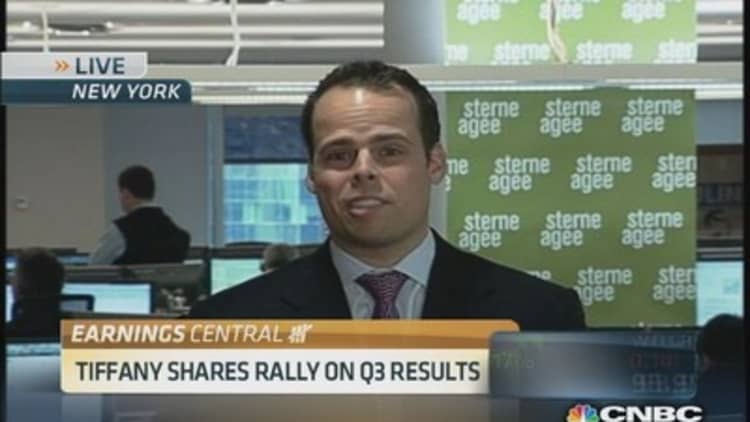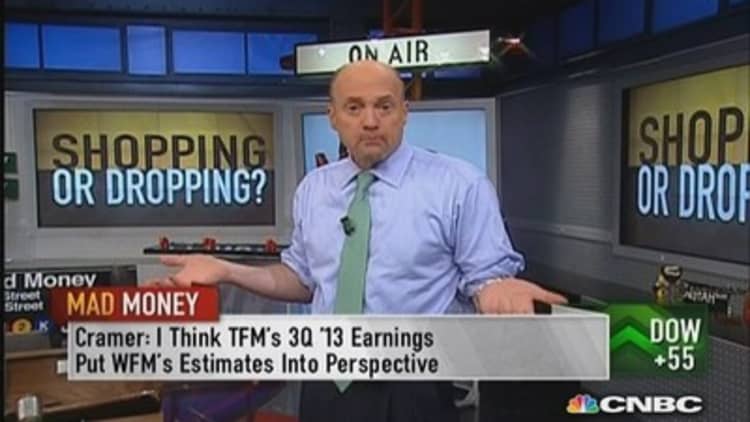
Tiffany on Tuesday said Chinese jewelry shoppers turned out in big numbers last quarter, mitigating ongoing softness in the U.S., and the U.S. jeweler again raised its full-year profit forecast.
Global sales rose 7 percent to $911.5 million in the third quarter ended Oct. 31, above the $889.5 million that analysts were expecting, according to Thomson Reuters I/B/E/S. Comparable sales, which include those at stores open at least a year and from e-commerce, rose 7 percent.
Tiffany, famed for its robin's egg blue jewelry boxes, expects its sales momentum to continue during the holiday quarter, when it gets a third of its annual sales, with gains in every region.
(Read more: 'Black Thursday' mission: Short lines, less fights)
Faced with slowing growth in its two top markets of Japan and the United States in recent years, the retailer has focused on building its business in China. By the end of the fiscal year, it will have 26 stores there, up from 22 at the start.
So far, betting on the world's second-largest luxury market is paying off.
Comparable sales in the Asia excluding Japan, a region that now accounts for almost one-quarter of Tiffany's sales, rose 22 percent, well above analysts' expectations. The company is benefiting from affluent Chinese shoppers' growing preference for diamond jewelry over gold as gifts for special occasions.
But in other regions, including at home, Tiffany's sales grew more modestly.
In the Americas, comparable sales rose 1 percent, roughly in line with estimates. The jeweler attributed the increase to strong sales at its famed Fifth Avenue flagship in New York, a popular destination for foreign tourists, while other U.S. stores did not fare as well.
(Read more: Investors, not homebuyers, driving prices up: Shiller)

The company has struggled in the United States, its biggest market, to find the right mix of the expensive jewelry for which it is known and the more-affordable silver items, typically less than $500, that generate 25 percent of sales and comprise its most profitable category.
Tiffany introduced some new silver jewelry lines this year and hired a new design director in September to improve its fashion collections.
"It doesn't seem like it's resonating yet with shoppers—you need to U.S. sales get going," said Edward Jones analyst Brian Yarbrough.
But Chief Financial Officer Jim Fernandez said on a call with analysts that Tiffany was "now seeing some improvement" in its fashion jewelry sales.
(Read more: Large employers cite 'Cadillac' tax in benefit cuts)
A poll of 795 Americans that Ipsos conducted for Reuters earlier this month found 39 percent planned to spend less on jewelry this holiday season, while only 3 percent intended to spend more.
Still, analysts expect Tiffany's U.S. comparable sales to rise at a faster clip—2.5 percent—this holiday quarter.
Signet Jewelers, which operates the Kay Jewelers and Jared chains, said its U.S. same-store sales had risen 4.2 percent in the latest quarter. Zale Corp., a mid-tier U.S. specialty jeweler, will report results Tuesday afternoon.
In Europe, Tiffany's comparable sales increased 2 percent, with Britain compensating for weakness on the Continent. In Japan they rose 5 percent, stripping out the effect of foreign exchange.
Tiffany reported net income of $94.6 million, or 73 cents per share, compared with $63.2 million, or 49 cents per share, a year earlier. Analysts were expecting 58 cents per share.
The company benefited from lower diamond, gold and silver costs.
Tiffany raised its full-year profit forecast by 15 cents per share to a range of $3.65 to $3.75. It still expects net sales worldwide to increase by a mid-single-digit percentage rate for the fiscal year.
After the earnings announcement, the company's shares rose in pre-market trading. (Click here to track the company's shares.)
—By Reuters

